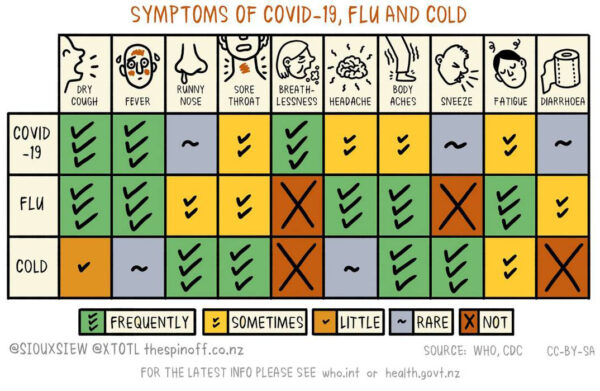A Cold or the Flu; What is the Difference?
The symptoms of a cold and flu are similar and often the first sign of a sniffle is mistakenly called the flu. However, flu is much more severe and tends to cause aching muscles and bones, while being quite rapid in onset. Flu can also be fatal; it kills at least 500 New Zealanders each year, usually the elderly, the infirm and those with other health problems such as lung disease. Most outbreaks of flu are seasonal, at their worst in winter and usually disappearing in spring. A flu pandemic can, however, break out at other times of the year, especially when a new and deadly strain of virus appears.
What Causes Colds and Flu?
When the cold or flu virus reaches the warm moist environment at the back of the nose, it injects itself into your cells and multiplies, using your cell’s machinery for replication. Your body responds to this foreign invader by activating the immune system, and chemicals released by nasal cells cause an inflammatory response in your upper respiratory tracts.
Cold symptoms appear gradually with the characteristic itchy runny nose, sneezing and coughing. You may also develop headache and feel tired and generally unwell, but after 3-4 days you should start to feel better.
The body reacts differently to the flu virus. Symptoms appear suddenly and you will feel very unwell very quickly as your response to the virus affects the whole body. Although fever is rare with a cold, it is a sure sign of the flu and can be as high as 40°C. Bed rest is usually needed and these symptoms could persist for a number of days.
How do you Catch a Cold or the Flu?
Cold and flu viruses are highly contagious and are easily passed on or transmitted. This happens when you cough or sneeze, by forming an aerosol of droplets containing a virus, which can then be inhaled by anyone near you. It can also be transmitted by direct contact when you blow your nose and then touch another object, leaving infectious virus behind. Within 12 hours of making contact with a cold virus, you will feel that tickle in your nose and scratchy feeling at the back of your throat. Between 18 and 72 hours, you’ll have chills, fever and aching heralding the flu.
What are the Symptoms?

Prevention and Treatment
1. Keep the virus to yourself
While you have symptoms you will spread the virus, so keep yourself away from others, wash your hands regularly and use disposable tissues. Isolation is particularly important to contain the spread of flu during an epidemic.
2. Boost your immune system
There is evidence that vitamin C might help the symptoms of a cold; and echinacea, a natural herbal product, has been found in one study to reduce the severity of symptoms but it can cause side-effects including acute allergy.
3.Treatment
Symptom relief
For the flu, if you feel achy and sore, go to bed and take simple pain relief such as paracetamol. Sometimes anti-inflammatory medications such as ibuprofen may also help with the aches and pains. Decongestant nasal sprays and chest rubs containing eucalyptus oils may help with a stuffy nose.
Antiviral drugs
There are antiviral drugs available for treating severe cases of flu. These work by blocking cell infection or the release of virus from infected cells, however they need to be taken with the onset of symptoms. There are no antiviral drugs available for the common cold, although studies are underway to look for one.
4. Secondary infection and complications
A cold usually lasts a few days before you start to feel better. However if you continue to feel unwell and develop different symptoms like a bad cough, inflamed sinuses or very sore throat, then you have probably got a secondary infection, such as bronchitis or sinusitis. Children often develop a middle ear infection following a cold. Secondary infections are usually caused by bacteria, which in some cases can be treated with antibiotics. Another complication to watch out for if you have asthma is aggravation of breathing difficulties.
Secondary infections can also happen with flu, but complications are more serious and usually affect the lungs causing pneumonia, which may require hospital treatment. Also, an ongoing medical condition, such as heart disease, can become worse after a bout of flu. Patients with diabetes and other significant health problems need to seek medical help if their flu symptoms get worse over time.
5. Flu vaccination
The Ministry of Health highly recommends that anyone who is vulnerable and at risk of flu complications should get vaccinated and they are offered free vaccination. This includes anyone:
- Over 65 years
- Pregnant
- With respiratory problems like asthma or bronchitis
- With ongoing medical conditions like diabetes, heart, kidney or liver disease and most cancers
- With conditions affecting the immune system like AIDS, rheumatoid arthritis or organ transplants
- With certain mental health conditions such as schizophrenia or major depressive disorder
- Aged 6 months to 12 years.
This vaccine is active against the influenza virus but has no effect against any other virus, including the cold virus. Because the flu virus is constantly changing its structure, new vaccines are constantly being developed to keep track. In New Zealand the National Influenza Strategy Group (NSIG) tries to keep one step ahead of the ever-changing virus by selecting the best vaccines to offer each year. Anyone can catch influenza, regardless of how fit or healthy you are and so vaccination is available to everyone.

















Community